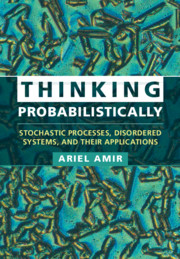
-
Select format
-
- Publisher:
- Cambridge University Press
- Publication date:
- 15 December 2020
- 17 December 2020
- ISBN:
- 9781108855259
- 9781108479523
- 9781108789981
- Dimensions:
- (244 x 170 mm)
- Weight & Pages:
- 0.55kg, 242 Pages
- Dimensions:
- (244 x 170 mm)
- Weight & Pages:
- 0.44kg, 242 Pages
You may already have access via personal or institutional login
Book description
Probability theory has diverse applications in a plethora of fields, including physics, engineering, computer science, chemistry, biology and economics. This book will familiarize students with various applications of probability theory, stochastic modeling and random processes, using examples from all these disciplines and more. The reader learns via case studies and begins to recognize the sort of problems that are best tackled probabilistically. The emphasis is on conceptual understanding, the development of intuition and gaining insight, keeping technicalities to a minimum. Nevertheless, a glimpse into the depth of the topics is provided, preparing students for more specialized texts while assuming only an undergraduate-level background in mathematics. The wide range of areas covered - never before discussed together in a unified fashion – includes Markov processes and random walks, Langevin and Fokker–Planck equations, noise, generalized central limit theorem and extreme values statistics, random matrix theory and percolation theory.
Reviews
‘A remarkable demonstration that advanced topics need not be esoteric. Amir takes us through random walks on networks, extreme value statistics, Kramers theory, anomalous diffusion and other topics generally omitted from introductory texts, always rooting every discussion in applications of terrific current interest. I found the discussion of Lévy-stable distributions especially insightful as a principled approach to the nonstandard walks that abound in contexts from biophysics to finance.'
Philip C. Nelson - University of Pennsylvania
‘The book is a suitable springboard for self-study because it introduces a wide variety of topics and contains many references to current work. In the classroom, the book can function either as the basis for a course in special topics or as a source of material to spice up more traditional statistical-mechanics courses … the methods for studying random phenomena introduced in Thinking Probabilistically will help readers understand reasoning techniques that may not be terribly familiar to physicists. Moreover, following the author’s arguments is a rewarding intellectual exercise in its own right.’
Rob de Ruyter Source: Physics Today
Contents
Metrics
Altmetric attention score
Full text views
Full text views help Loading metrics...
Loading metrics...
* Views captured on Cambridge Core between #date#. This data will be updated every 24 hours.
Usage data cannot currently be displayed.
Accessibility standard: Unknown
Why this information is here
This section outlines the accessibility features of this content - including support for screen readers, full keyboard navigation and high-contrast display options. This may not be relevant for you.
Accessibility Information
Accessibility compliance for the PDF of this book is currently unknown and may be updated in the future.


